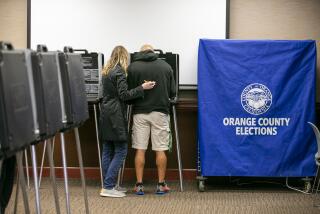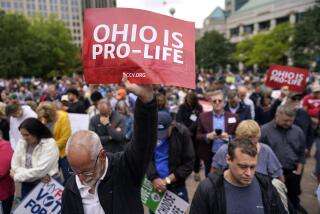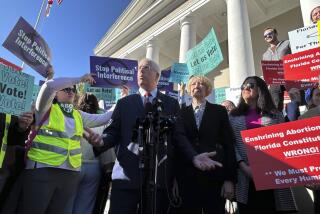Supreme Court to hear voter ID case
The Supreme Court on Tuesday agreed to decide whether states can require voters to show government-issued photo identification before they cast a ballot.
The justices’ ruling, due by the end of June, could have a major effect on the 2008 presidential election and on congressional races in several states.
New photo ID laws in Indiana, Georgia and Arizona have been upheld in the last year, while a Missouri law was blocked from taking effect. By agreeing to hear an appeal from Indiana Democrats, the justices signaled that they wanted this legal dispute resolved before voters go to the polls next fall.
Since 2002, Republicans have championed photo IDs as a means to prevent fraudulent voting. Under the laws, a voter must show government-issued identification -- such as a driver’s license or a passport -- to prove to poll workers that he or she is indeed the person registered to vote.
Democrats, however, have strongly opposed the requirement, saying it tends to discourage people who usually vote Democratic. Tens of thousands of poor, elderly, disabled, homeless or foreign-born citizens do not have valid photo ID cards, Democrats say.
An AARP survey, for example, found that 3% of elderly registered voters in Indiana did not have a current driver’s license. Even if these people had cast ballots in the past and remained eligible voters, Democrats argue, they might be dissuaded from voting next year because of the photo ID requirement.
What’s more, Democrats say, it is exceedingly rare for would-be voters to adopt another person’s identity to cast a ballot. They contend that fraudulent voting is more likely among those who file absentee ballots by mail.
In defense of the laws, Republicans say states -- including Indiana -- offer free photo ID cards to any voter who needs one, so long as there are basic documents, such as a birth certificate, to establish identity.
This issue has divided state legislators along partisan lines, and the same split has been apparent in the judicial rulings. The U.S. appeals court in Chicago upheld Indiana’s law on a 2-1 vote, with two Republican appointees in the majority and a Democratic jurist dissenting.
Lawyers for the American Civil Liberties Union, the NAACP and the Indiana Democratic Party filed appeals, arguing that the photo rule would act to deprive citizens of the right to vote -- as poll taxes or literacy tests did before the 1960s.
On Monday, the Supreme Court justices met for the first time since returning from their summer recess. They spent the day sifting through more than 2,000 appeals. And on Tuesday morning, they announced they had agreed to take up 17 of them, including the photo ID case.
“There’s no right more important than the right to vote,” said Ken Falk, legal director for the ACLU of Indiana. “If recent history teaches us anything, it’s that each vote matters. We are hopeful that the Supreme Court will recognize this bedrock principle of our constitutional democracy.”
But Indiana Atty. Gen. Steve Carter said those challenging the law were exaggerating its effect. “Most telling of all, despite the hue and cry about the supposed burdens of this law,” he said, the lawyers who filed suit could not identify “a single actual voter who could or would not vote because of the voter ID law.”
The Republican drive against voter fraud is a legacy of former White House political director Karl Rove. He had highlighted reports of suspect voting and pressed Republican leaders to move aggressively to combat it.
The GOP was most effective in pointing to problems when it came to registering new voters. Some liberal organizations sponsored drives to register prospective voters, and they paid collectors to gather signature cards. Later investigations found these groups repeatedly signed up people who were not eligible to vote. Some were not citizens, were not residents of the area or were felons who had lost their right to vote.
However, there was far less evidence that such voter drives resulted in fraudulent balloting; usually, the ineligible registrants were wiped from the rolls beforehand. Indiana officials admitted during the lower court battle over the state’s new law that they could not point to an example of a voter who succeeded in casting a ballot by impersonating another Indiana voter.
The Democratic National Committee on Tuesday applauded the court’s decision to hear the Indiana case. “The Supreme Court will have an opportunity to right a wrong perpetrated by the GOP,” said Donna Brazile, chairwoman of the DNC Voting Rights Institute. “Unjust and highly restrictive voter ID laws,” she said, were part of “a reprehensible partisan scheme to suppress voter turnout.”
Republican National Committee officials did not issue a statement Tuesday, but they have stressed in the past that states such as Indiana were not preventing or deterring any eligible voter from casting a ballot.
The Indiana cases, Crawford vs. Marion County Election Board and Indiana Democratic Party vs. Rokita, will probably be heard in January.
More to Read
Start your day right
Sign up for Essential California for news, features and recommendations from the L.A. Times and beyond in your inbox six days a week.
You may occasionally receive promotional content from the Los Angeles Times.







